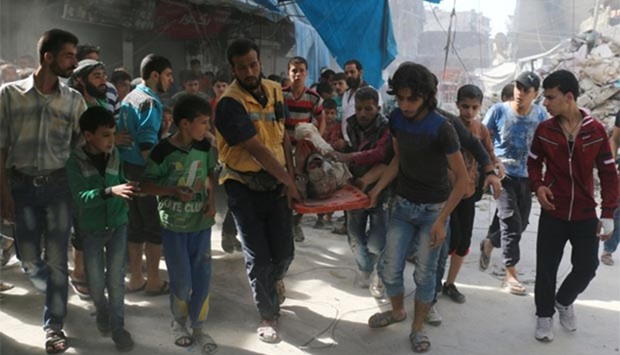Russian and Syrian warplanes pounded Aleppo again on Thursday after two days of heavy bombardment that killed more than 70 civilians, as world powers prepared for last-ditch weekend talks on a ceasefire.
Syria has been plunged into some of the worst violence of its five-year war after the collapse of a hard-won truce brokered by Washington and Moscow.
The ensuing surge in fighting saw government forces declare a large-scale offensive, backed by Russian and Syrian air power, to capture the opposition-held half of battered Aleppo.
More than 20 air strikes hit the rebel-controlled east at dawn on Thursday, killing seven civilians, the Syrian Observatory for Human Rights monitoring group said.
On the northeastern outskirts of the city, advancing regime troops captured several hilltops overlooking opposition-held areas.
Syrian state television said four children were killed by rebel rocket fire on a school in a western regime-held neighbourhood.
Moscow has come under mounting international pressure over the rising civilian death toll from Syrian President Bashar al-Assad's Russian-backed campaign to take east Aleppo, including Western accusations of possible war crimes.
Seven children were among 71 civilians killed in strikes and regime artillery fire on eastern districts on Tuesday and Wednesday, Observatory head Rami Abdel Rahman said.
Opposition shelling on government-held districts of the city, meanwhile, killed at least eight civilians over those two days, according to the British-based monitor, which relies on a network of sources on the ground.
Fresh weekend diplomacy
Since the army announced its assault on the city on September 22, Russian and government bombardment on the eastern districts has killed more than 370 people, including 68 children, according to an Observatory toll.
Shelling and rocket fire by myriad rebel and jihadist groups, meanwhile, has killed 68 people in government-held areas.
Several major international efforts have failed to secure a political solution to the war, which has killed more than 300,000 people.
A new diplomatic push will take place this weekend. US Secretary of State John Kerry and Russian Foreign Minister Sergei Lavrov are expected to be joined in Lausanne on Saturday by counterparts from Turkey, Saudi Arabia and Qatar -- all backers of Syrian opposition forces.
Neither side has confirmed an invitation to Iran, a key player in the conflict and an ally of Assad.
Then in London on Sunday, Kerry will likely meet up with his European counterparts from Britain, France and Germany.
The United Nations said Syria envoy Staffan de Mistura had been invited to take part in the talks but it was unclear if he would attend.
Lavrov told CNN in an interview on Wednesday that he hoped the discussions in Switzerland could help "launch a serious dialogue" based on the now-defunct US-Russian pact.
'Political rhetoric'
The two world powers had worked closely in recent months and reached a deal in mid-September that was billed as the "best chance" to end Syria's bloodshed.
That agreement envisioned a halt to hostilities, increased humanitarian aid to hundreds of thousands of besieged civilians across Syria, and unprecedented coordination between Moscow and Washington against jihadists.
But the truce fell apart after a week, and peace efforts have since struggled to get off the ground.
A French-drafted resolution was shot down by Russia in a stormy UN session last weekend.
Russian President Vladimir Putin hit out at Paris for the vetoed proposal, accusing it of deliberately putting forward a motion "fanning hysteria around Russia."
Putin dismissed accusations of possible war crimes as "political rhetoric" and warned Western countries against imposing sanctions on Russia.
New Zealand on Wednesday presented another draft resolution demanding an end to air strikes on Aleppo.

Syrians carry the body of a man following air strikes on the rebel-held Fardous neighbourhood in Aleppo on Wednesday.
